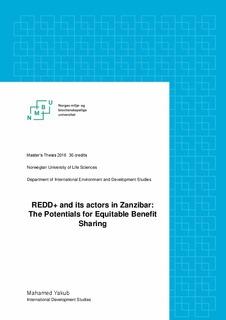| dc.description.abstract | Climate change and its possible negative effects are increasingly recognized as some of the critical challenges the world is facing today. The debates on how to tackle the problems of climate change have been escalating and still are among the controversial issues continuously discussed in international platforms. It is estimated that deforestation and forest degradation may account for nearly 20% of the global emissions. Reduced Emissions from Deforestation and forest Degradation (REDD+) is one of the mechanisms designed to tackle the hazards from the world`s changing climate. The idea behind REDD+ is to create a financial value for the carbon stored in forests, offering incentives for developing countries to reduce emissions from forested lands and invest in low-carbon paths to sustainable development.
Apart from mitigating climate change problems, REDD+ as a mechanism, has pro-poor approaches which attempt to improve the lives of the poor forest dependent communities. Special attention is given to the most vulnerable groups such as the women. Studies on REDD+ projects, both in Africa and elsewhere, suggest the importance of local community participation in the decision making process in order to increase fairness and equity in the benefit sharing process.
Developing countries in the south are important actors in the implementation process of the climate change mitigation mechanisms. Tanzania is one of the African states, where REDD+ pilot projects have been implemented. As part of its contribution to the global climate changes mitigation efforts, the government of Norway funded nine REDD+ pilot projects in Tanzania. Eight of these nine pilot projects were implemented in mainland Tanzania while the ninth one was on the Island of Zanzibar. This REDD+ pilot project called HIMA, in Ksiwahili, Hifadhi ya Misitu ya Asiali’, meaning Conservation of Natural Forest lasted for four years. It began in April, 2010 and ended in December, 2014. The project was implemented in both Unguja and Pemba islands
This thesis, using the pilot REDD+ HIMA project as a case study, explores the potentials for equitable benefit sharing in future REDD+ and other similar climate change interventions in Zanzibar. In particular, the study investigates the potential roles of JUMIJAZA in ensuring equitable benefit sharing. The findings of this study are based on data collected using qualitative research approaches (semi-structured individual interviews and focus group discussions) and reviewing project related documents.
Based on its findings, the study argues that despite being a very young organization with limited capabilities and experiences, JUMIJAZA is a legitimate representative of the various SCCs which has the potentials to serve and defend the interests of the people in the respective Shehias.The findings of the study also show that the organization has a number of potentials including the acceptance from the community and the government; the full awareness of the SCCs about the importance of the forest conservation and the recently finalized validation process, which grants the certificate to sell the carbon. In addition, its legal status and its approved byelaws give JUMIJAZA extra acceptance and acknowledgement from the international community and the donors. Based on this, the study further concludes that JUMIJAZA is an entity that has the potentials to ensure equitable benefit sharing in future REDD+ and other similar interventions in Zanzibar. | nb_NO |
